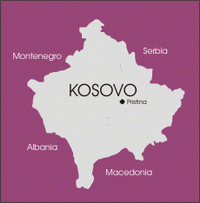Diplomats gather in Vienna to discuss Kosovo's future status
Representatives of the Contact Group on Kosovo meet in Vienna on Wednesday to hammer out a way forward for stalled talks on the future status of the breakaway Serbian province.

Diplomats representing the group, which includes the U.S., Britain, France, Germany, Italy and Russia, will review a deadlocked U.N. plan that would have given Kosovo internationally supervised statehood - a proposal opposed by Serbia and Russia, a traditional ally of Belgrade.
Meeting behind closed doors, the envoys were expected to lay the groundwork for new negotiations between the Serbs and Kosovo's independence-seeking ethnic Albanian majority, with talks potentially to start in August or September.
Diplomats said the idea would be for U.S., Russian and EU mediators initially to shuttle between Belgrade and Pristina, Kosovo's capital.
Although Kosovo formally remains a part of Serbia, it has been under U.N. administration since 1999, when NATO airstrikes ended former Yugoslav leader Slobodan Milosevic's crackdown on ethnic Albanian separatists.
Kosovo's future shifted to the Contact Group after it became clear that Russia - which holds veto power in the U.N. Security Council - would not agree to U.N. special envoy Martti Ahtisaari's stalled roadmap to eventual independence.
U.S. and European officials have agreed to allow 120 days for further negotiations that would include talks with Kosovo and Serbia in a last attempt to reach an agreement.
Concerns have grown that Kosovo's leaders, increasingly frustrated by setbacks and delays, might unilaterally declare independence, throwing the Balkans into new turmoil.
Albert Rohan, an Austrian diplomat who served as Ahtisaari's deputy, told public broadcaster ORF on Wednesday that a one-sided declaration of independence was premature and would succeed "only if it is recognized by a substantial number of states."
The U.S. has indicated it is prepared to recognize Kosovo's independence within months, although Secretary of State Condoleezza Rice urged the province's leadership in Washington this week not to "short-circuit" the latest diplomatic effort.
Meanwhile, in Belgrade, Serbia's parliament adopted a resolution overnight that promises an "energetic response" against the United States and EU countries if they recognize Kosovo's independence without U.N. consent.
The resolution, drafted by Serbia's government, says that "any unilateral recognition of Kosovo's independence would have unforeseeable consequences for regional stability."
It says Serbian authorities "must immediately and energetically respond to signs by any international subject which seeks to jeopardize the sovereignty and territorial integrity" of the Balkan country.
The resolution did not specify what measures Serbia would take against countries that might recognize the province's independence, but government officials said they could include downgrading or even cutting of diplomatic ties with such states.
Subscribe to Pravda.Ru Telegram channel, Facebook, RSS!

